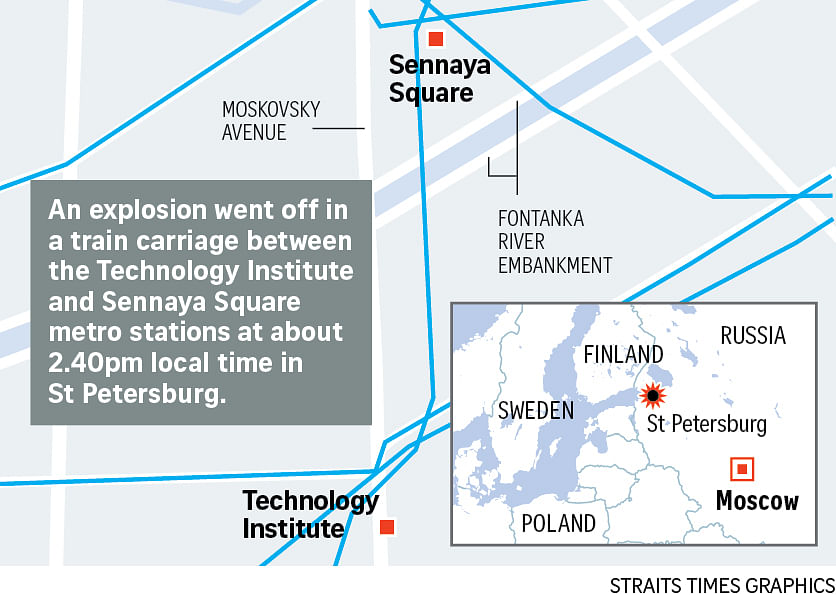Russian investigators confirm Kyrgyz-born Russian citizen was behind St Petersburg subway attack
Sign up now: Get ST's newsletters delivered to your inbox
ST PETERSBURG (REUTERS/AFP/BLOOMBERG) - Russia's Investigative Committee on Tuesday (April 4) named Kyrgyz-born Russian citizen Akbarjon Djalilov as the man behind the St Petersburg metro blast, confirming an earlier statement from Kyrgyzstan's security services.
"The investigation identified the man who set off the bomb in the carriage of the Saint Petersburg metro. It was Akbarjon Djalilov," a statement by the committee said, adding that Djalilov's "genetic trace" was also found on a bag with a second bomb that was found at a different station.
The second bomb, which was hidden in a fire extinguisher, was defused by the authorities.
The perpetrator had radical Islamist links, Russian media cited law enforcement officials as saying, raising the possibility the attack could have been inspired by the Islamic State in Iraq and Syria, which has not struck a major city in Russia before.
The blast on Monday has killed 14 people so far and injured almost 50.
"It has been ascertained that an explosive device could have been detonated by a man, fragments of whose body were found in the third carriage of the train," the committee, which has sweeping powers, said in a statement.
It was not immediately clear whether the man was counted among the dead.
The Kyrgyz GKNB security service had said the suspect was born in the Kyrgyz city of Osh in 1995. "It is probable that he acquired Russian nationality," it said.
Kyrgyzstan, a predominantly Muslim central Asian nation of six million, is Russia's close political ally and hosts a Russian military airbase.
Interfax had reported earlier that the suspect had carried an explosive device into the St Petersburg subway in a rucksack.
The blast occurred in a train carriage as it was travelling between the Technological Institute and Sennaya Square stations at 2:40pm local time on Monday, said the spokesman for Russia's anti-terrorist committee (NAK) Andrei Przhezdomsky.
St Petersburg's Sennaya Square metro station was reopened on Tuesday after an anonymous phone call warning of another possible attack triggered a brief closure, Russian news agency RIA Novosti reported. Several fire engines were seen outside the station.
Russian President Vladimir Putin, who was in the city at the time of the blast, went to lay flowers late on Monday at the scene.
Mr Putin made no comment, but left a bouquet of red roses at the entrance to the Technological Institute metro station. The area was sealed off by security forces.

Pictures screened on national television showed the door of a train carriage blown out, as bloodied bodies lay strewn on a station platform.
Above ground, emergency services vehicles rushed to the scene at the Technological Institute metro station, a key transport hub in the city centre.
"I will be afraid to take the metro now," said Ms Maria Ilyina, 30, standing near the station, where people improvised a memorial by bringing flowers to the scene.
"Before we thought that this would not come to St Petersburg, now our city is under threat," she said.
Pensioner Vyacheslav Veselov said he had seen four bodies at the station. "A station attendant in tears called on the men to help carry the bodies," he said.
The metro network in St Petersburg reopened some of the lines on Tuesday but there remained "only limited service on the two lines in the blast area".
The Moscow metro also tweeted that it was "taking additional security measures" as required by law in such situations.
NAK said in a statement carried by Russian news agencies that security was being stepped up at transportation hubs and crowded spots across the country.
St Petersburg announced three days of mourning in the city starting Tuesday.
In Washington, US President Donald Trump described the blast as a "terrible thing".
"Happening all over the world, absolutely a terrible thing," Mr Trump said during an event at the White House.
Kremlin spokesman Dmitry Peskov said later that the bombing was being discussed with the White House through diplomatic channels.
EU foreign policy chief Federica Mogherini wrote on Twitter she was following developments "together with all EU foreign ministers" gathered for a meeting in Luxembourg.
"Our thoughts are with all the people of Russia," she wrote.
It is not the first time extremists have targeted Russia's public transportation systems.
In 2013, Russia was hit by twin suicide strikes that claimed 34 lives and raised alarm over security at the Sochi Winter Olympic Games.
A bombing at the main railway station of the southern city of Volgograd killed 18 people, while a second strike hit a trolleybus, killing 16.
A suicide raid on Moscow's Domodedovo airport claimed by Islamic insurgents from the North Caucasus killed 37 people in January 2011.
Russia has intervened militarily to bolster Syrian President Bashar al-Assad's forces in September 2015, turning the tables on the battlefield just as rebel forces were strengthening their hold on key areas.
Russian bombardments helped the regime retake rebel areas in the east of the northern city of Aleppo after four years of fighting.


